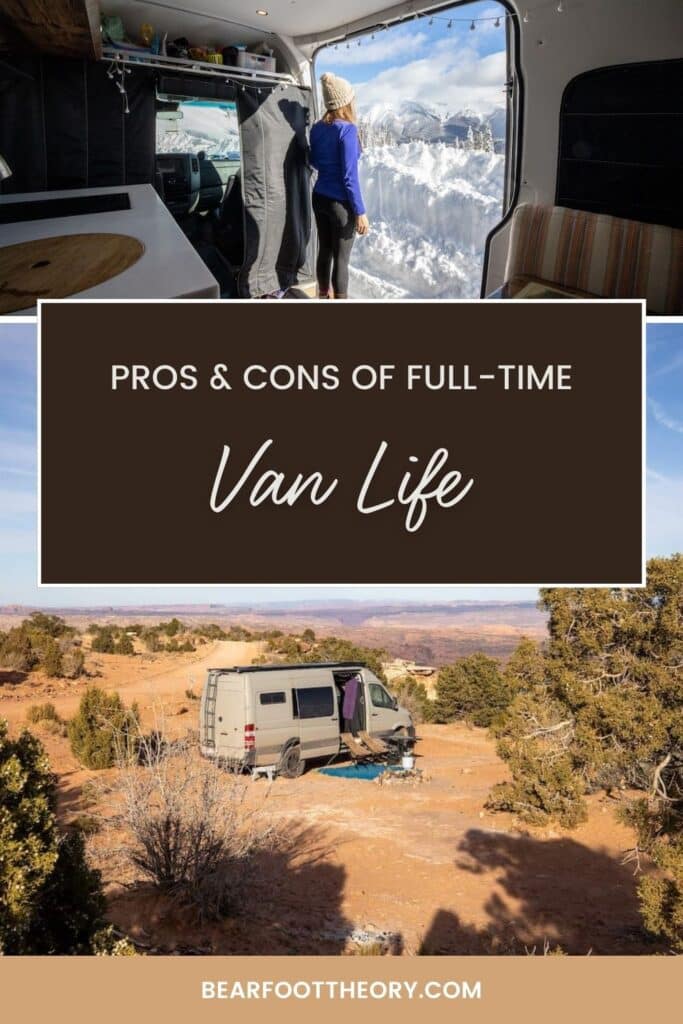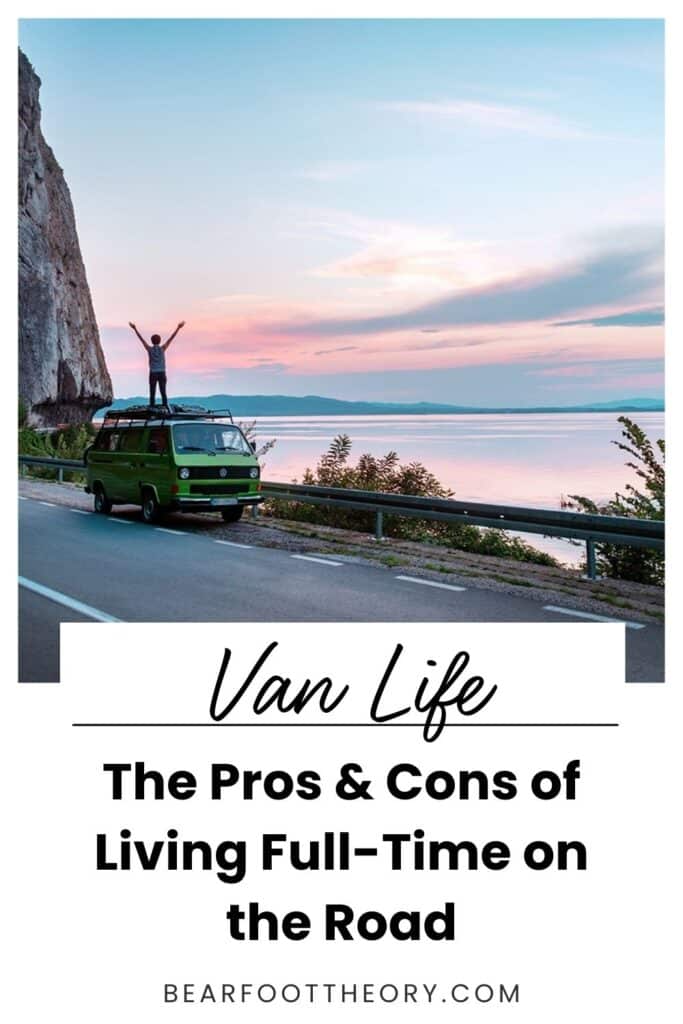Pros and Cons of Full-Time Van Life
Are you ready for full-time van life? Weigh the pros and cons to help you decide if it’s right for you.
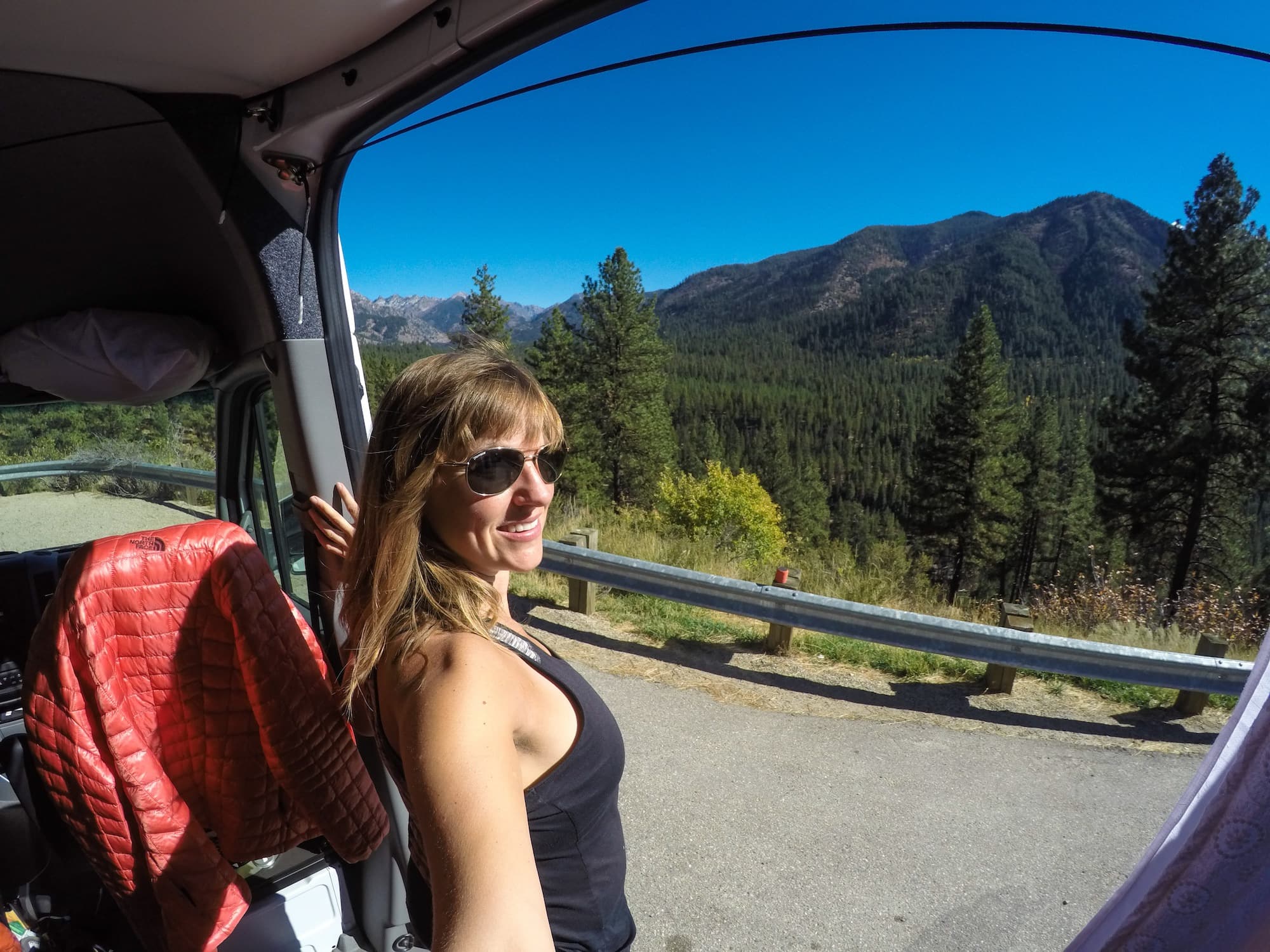
If you are thinking about starting van life, in the process of buying a camper van, or in the middle of a van conversion, you might be grappling with the question of whether you should give up your home and live indefinitely in a van full-time.
In 2016, I got my first Sprinter Van, moved out of my apartment, and spent nearly two years rent-free. It was a liberating time full of adventure, self-realization, and growth, but it also came with challenges. I loved the freedom of not having rent and stuff holding me back, but there were definitely things I didn’t consider – like what happens when your van needs repairs or if you need to spend extended time in a city where there isn’t abundant free camping.
In this blog post, I share the pros and cons of full-time van life that you’ll want to consider before you take the plunge. Evaluating the benefits of van life and the difficulties that sometimes arise will help you to decide whether you are ready to give up a conventional life (at least for a bit) for the unknown.
This post may contain affiliate links.
My Full-Time Van Life Experience
Back in 2016, when I got my Sprinter Van, I was confident that I wanted to be a full-time van lifer. I had just gotten back to the US from three solo months in New Zealand where I explored the country in a camper van. Upon returning home, I wanted to be bill-free, rent-free, and have the freedom that came with that. My blog was already two years old and working remotely from my van was my ultimate goal. I sold the majority of my stuff, including my car, put the rest of my belongings in a small storage unit, and moved out of my Salt Lake City apartment.
When I moved into my van that summer, I was thrilled for the unknown and the adventures ahead of me. That first year, I traveled primarily solo around Southern Utah, Nevada, Washington, Idaho, California, and the Canadian Rockies.

The road was full of ups and downs as I slowly got into my groove with van life. I loved being able to wake up in the places I was writing about on this blog. Having so few obligations and responsibilities (other than my job) and minimizing the clutter in my life was incredibly freeing. Sleeping in my own bed, cooking my own meals, and being able to do what I wanted, when I wanted were luxuries that no other form of travel had provided.
At the same time, I experienced issues with my van build that required me to stay an extended period in LA where I had to replace my solar panels, repair my shower, and fix a bunch of other small things. Without a home to go back to or another car to drive, I ended up staying with my parents while my dad helped me address the issues I was having.

I also got a taste of what van life would be like in the winter. I was determined to learn how to ski that winter, so I planned to be in a snowy climate. After a few December nights outside of the mountains in Salt Lake City, I realized what that would entail (which I’ll go into below).
Back in 2016, working from the road was not as easy as I predicted. Internet for van lifers has come a long way since then, but at the time, I found myself planning my days around finding Wi-Fi so I could work, send emails, or plan out my day.
In the end, I did two years of full-time van life with no home base before I decided that I wanted to be a part-time full-time van lifer; in other words, I wanted to live in my van full-time in the summer and have a home base to come back to in the winter.
Being part-time on the road allowed me to experience many of the benefits of living in a van like the freedom to travel spontaneously and having the comforts of home on the road, while also having a cozy, warm home base where I can get big work projects done in the colder months.
I also became a new mom during this time, and having a home base while I adjusted to a whole new rhythm of life was invaluable. It gave me the space to rest and figure things out without the added pressure of being constantly on the move. But now that our son is a toddler, my partner Ryan and I felt ready to hit the road full-time again—this time as a family.
To support this new chapter, we transitioned from a van to a Rossmonster adventure truck. The extra space makes life with a little one way more manageable, and we still have the off-road capability and mobility we need to chase adventure and find those quiet, wild places we love most.
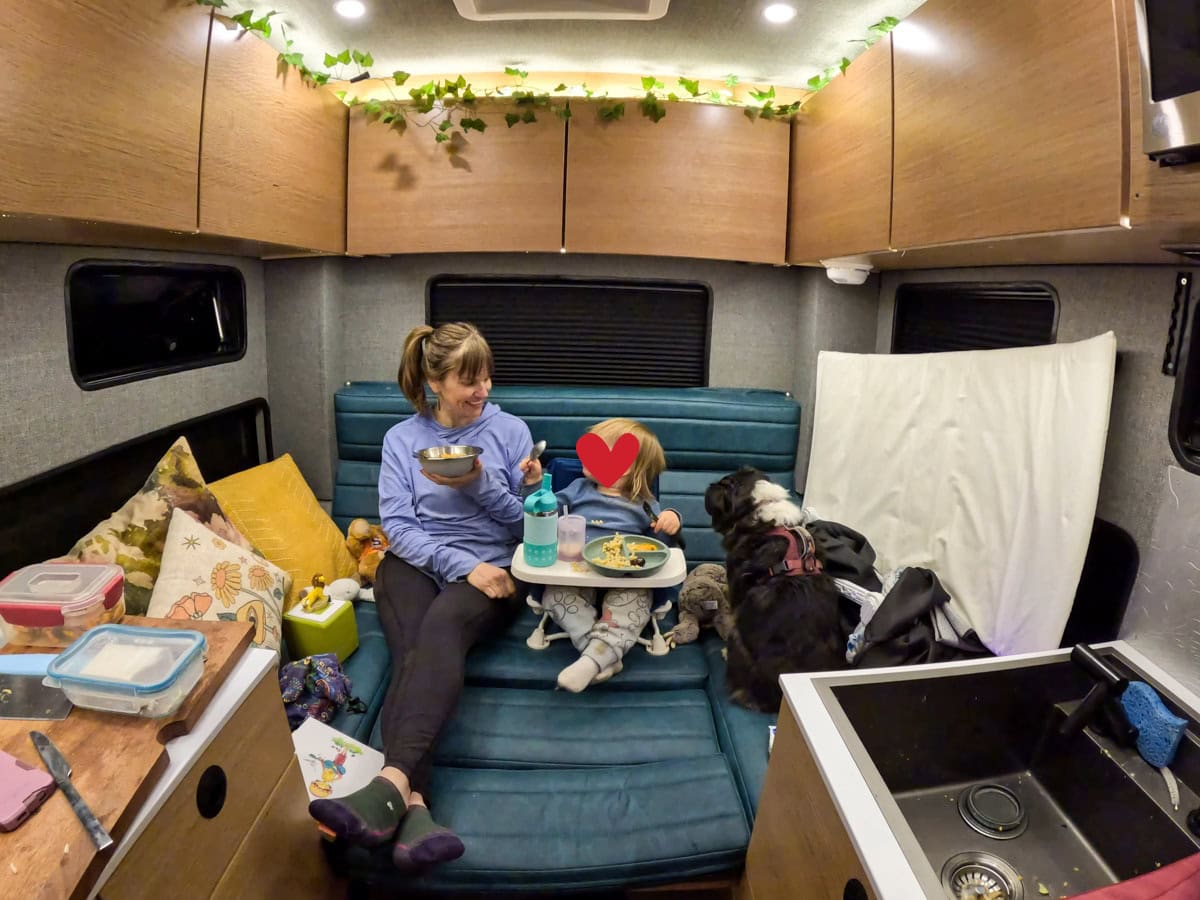
My time on the road has deeply shaped my life, and now I’m excited to share that sense of freedom and connection to nature with my son.
If you’re wondering if van life is the right choice for you, here I share the pros and cons of living in a van to help you decide.
Save this post!
Enter your email & I'll send this post to your inbox! You'll also receive my weekly newsletter full of helpful advice for planning your adventures.
Pros of Full-Time Van Life
With endless adventures and places to explore, living in a van certainly has its perks. There is nothing quite like the assurance of having everything you need with you at all times and the freedom of an open road in front of you. Here are eleven benefits of living in a van to consider.
1) Living in a van gives you the freedom to travel spontaneously
Although it may be obvious, one of the biggest perks of living in a van is the ability to travel wherever you want, whenever you want to go. It is an affordable and practical way to see as much of the country as possible.
With a home on wheels, you don’t have to worry about making hotel reservations or planning out a big itinerary. Even in popular destinations, you can typically find somewhere to park overnight. It might not be your ideal campsite, but anywhere can work for a night, which means there isn’t too much of a need for planning.
Instead of living for the weekends, living on the road in your van allows you to travel and adventure whenever it works in your schedule. You can also visit popular places or do crowded hikes during less busy times.
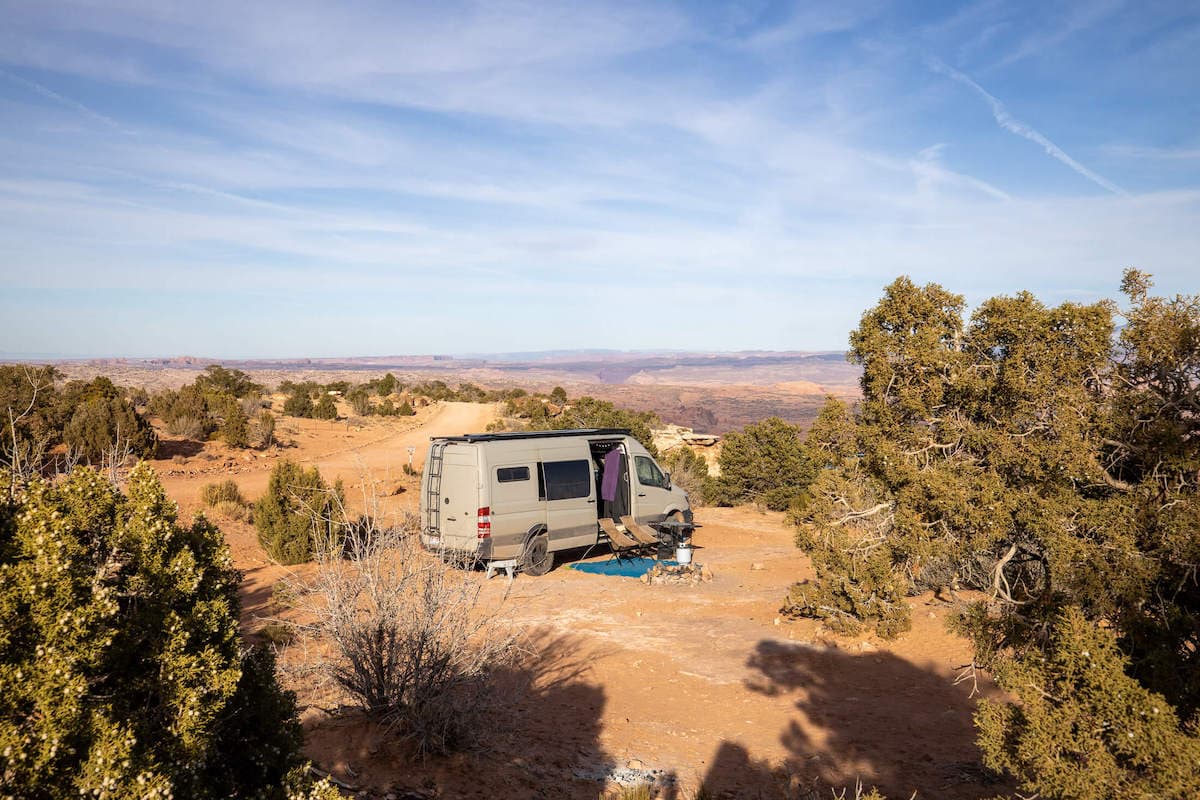
You can even change plans on a dime without losing deposits on rooms, plane tickets, and rental cars. If the weather turns ugly, you can hop in the van and escape to sunnier skies. Or, if you decide you want to attend a fun event or festival at the last minute, you can be ready to go at a moment’s notice.
2) You can scope out a potential future home base
One of the biggest benefits of van life is the opportunity to suss out places you might want to live one day. Living in a van means you can spend as long as you want in a location, which is a convenient way to get a feel for the vibe before committing to a lease or mortgage!
You can start to feel like a local while living in or near the same town for a couple of weeks. You may even be able to visualize yourself living there permanently. Some places end up surprising you, while others you’ll be able to rule out after spending time there.

3) You don’t pay rent or utilities
One of the best things about living in a van full-time is the lack of rent or mortgage and utilities that must be paid. These costs add up significantly each month.
In a van, you do not need to pay a monthly fee for electricity, heat, air conditioning, or trash service. Once you have your solar and electrical system installed, you can live off the grid for free indefinitely.
As rent rises and the housing market becomes less affordable, van life is an even more attractive option.
Rather than paying extremely high prices to live, a home on wheels allows you to stay in beautiful places for less. Even if you have a loan on your van or you pay for occasional camping, your monthly payment should be significantly cheaper than rent in a desirable location.

While not every town is as welcoming to van lifers (this is especially true along the coasts), most towns in the Mountain West have some form of free or inexpensive camping nearby, allowing you to enjoy the beauty of states like Colorado without paying the hefty price.
4) Van life *can* be an affordable way to travel
Van life isn’t inherently cheap, but it can be if you are conscious about your spending. First, you don’t have to pay for accommodations, and if you utilize resources to find free campsites, camping can be free. Also, with a kitchen or outdoor stove, you can cook your own meals. You don’t have to rely on restaurants which can be a huge expense while traveling.
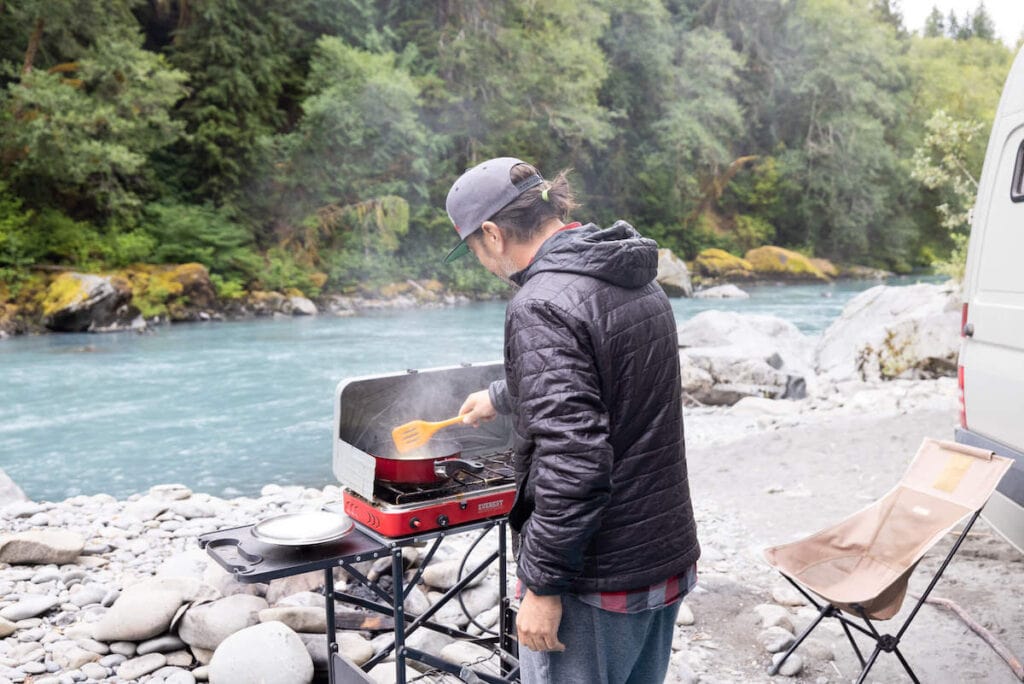
I find that full-time van lifers are more likely to stick to a budget than part-timers who tend to treat van life like a short-term vacation. As a full-time van lifer, I had a budget, and I stuck to it. I didn’t treat van life like a vacation, because it was in fact daily life. Now as a part-time van lifer on the road for shorter stints, I’m more likely to splurge.
5) Van lifers spend more time in nature
As a lover of the outdoors, my favorite thing about van life is it allows me to spend a significant portion of my day in nature. Depending on the weather, I can sit outside to drink my tea, work, and relax with a book at the end of the day.
But what I’m really here is for the adventure. If you’re like me and you love to hike, bike, or paddle, living in a van allows you to enjoy these hobbies in a variety of locations regularly. Instead of doing the same local hikes on repeat or the same loop around your neighborhood each morning, full-time van life allows you to easily mix up the scenery and experience a variety of beautiful landscapes.
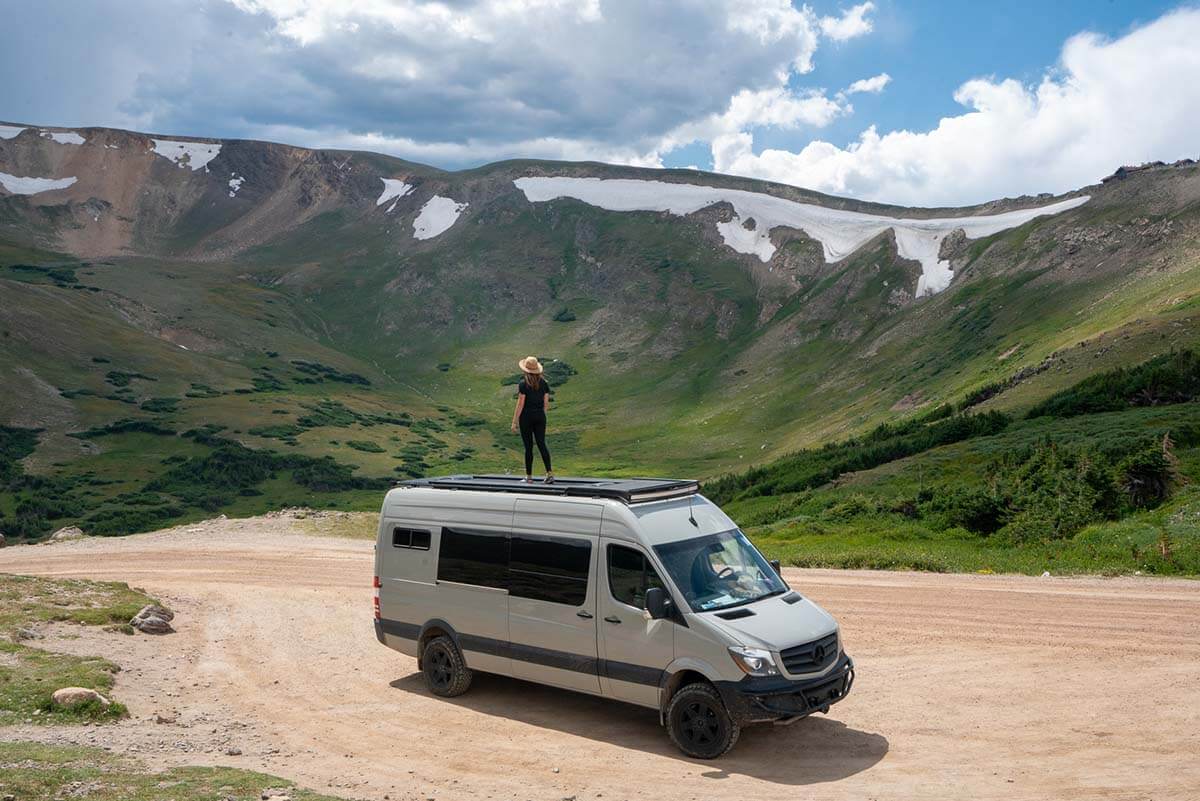
6) You learn to live with less
When you have fewer possessions, there is less to worry about. You do not have as much to clean, to care for, or to organize.
While some may see minimizing as a con, the van lifers on my team and I all agree there is happiness to be found in the simplicity.
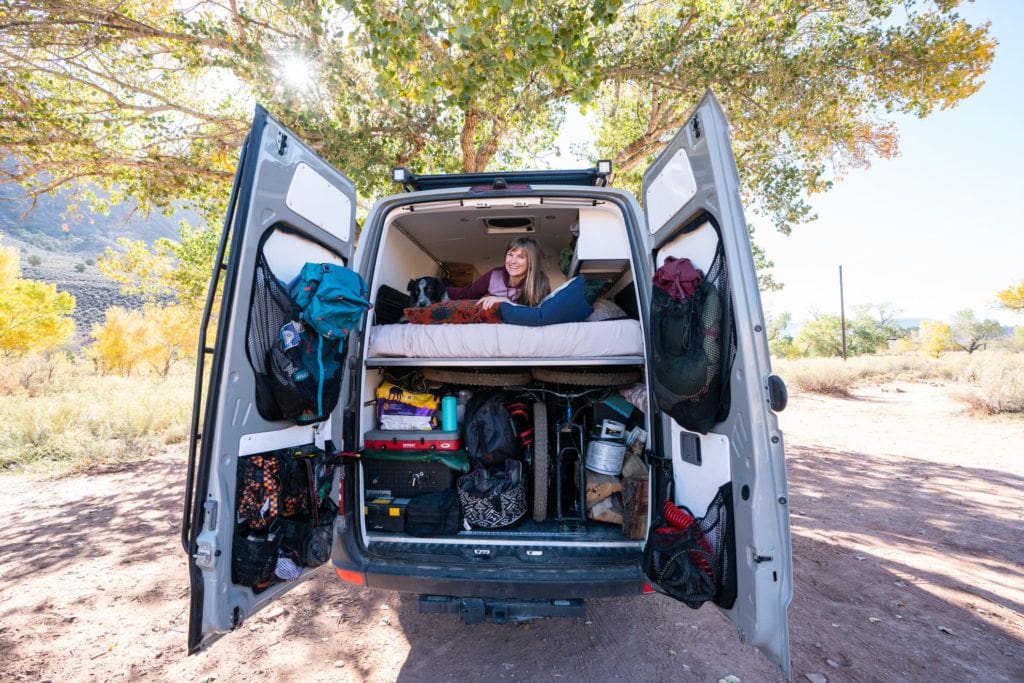
BFT Contributor Kaylin vividly remembers going through each room of her old apartment and deciding what to keep vs. let go when she was moving into her van. As someone who loves clothes and shoes, she says it was not easy at first; however, over time she became less attached to each item that she donated or sold. She has found that having fewer items is freeing.
Remember that you do not necessarily have to sell or donate all of the items you don’t bring with you in the van as storage is also an option. It is important to consider the value and attachment you feel towards your possessions. If you have a lot of valuable stuff you with personal meaning, then storage is probably the way to go.
If your stuff is inexpensive and you think you’ll eventually want to replace it, then by all means, sell what you can. This will give you a little extra cash when you are starting out, and you won’t be held back by your stuff that is sitting in a storage unit in a city you might not want to come back to.
Now that I’m doing part-time van life and have a house and a garage with more stuff than I’d like to admit, I miss the days of living in my van when my life was so clutter-free. I had everything I needed to enjoy life with me and nothing more. If I bought anything new, something had to go to make space for it. The lack of accumulation meant that I never felt bogged down by or had to consider my stuff when making plans for my future.
7) Chores are simpler
While van life comes with its unique chores, the overall process of cleaning and maintaining your home on wheels is quick and easy.
You do not need to worry about caring for a lawn, removing snow, or dusting and vacuuming a large living space. This saves precious time and stress, allowing you to have the option to get outside more and adventure.
However, you will have a few new chores such as refilling your water tank, emptying your pee jug or toilet waste (if you have one), sweeping out the sand and rocks that seem to quickly accumulate on the floor, and winterizing your van as needed. You will also need to make time to visit laundromats every so often.

I have found that if you do a little bit of basic cleaning and organizing of your van for a few minutes before you go to bed or right when you wake up, you can keep your space feeling tidy the majority of the time.
8) You have the comforts of home wherever you go
When you live full-time in a van, home truly becomes wherever you park it. If you are having a campfire and suddenly crave the warmth of your favorite blanket, you can quickly grab it from your van. Or, if you want to watch a movie on Netflix one evening while drinking a hot beverage out of your favorite mug with the heater on, this is doable in your van.
It is convenient to be able to enjoy the comforts of home no matter where you go. You also have access to all of your belongings at all times while traveling and no longer need to regret not packing your raincoat or favorite hat when you unexpectedly need it. Instead, you can simply grab it out of your van and continue with your adventures.

9) You get to meet all kinds of new people
One of the best parts of living on the road is connecting with other travelers and building a van life community on the road. You meet people from all sorts of backgrounds and walks of life. Because you usually aren’t in a hurry to get anywhere, you’re more likely to chat with people on the trail, your campground neighbors, or locals that you meet in town.
There are also numerous van festivals and gatherings all over the country, like the festival I organized in Idaho in 2019 and 2022 called Open Roads Fest. Many of these gatherings are designed around specific interests, helping you connect with other like-minded travelers. It’s not uncommon for van lifers to link up at these events and to caravan to new places afterward.

10) You get an office with a view
Instead of spending your days in a cubicle or office, living on the road allows you to work wherever you feel like. You can work from a cute coffee shop or choose to have an inspiring view of nature outside of your window each day.
Some days you might have a view of the ocean, while others could be spent working among the pine trees. While you may not be parked in an epic location all of the time, one of the joys of van life is being able to mix it up depending on how you feel.
There is nothing quite like working to the sound of a nearby creek. Perhaps not surprisingly, I’ve found that working from my van often fuels more inspiration and creativity than working in a traditional office setting ever did.
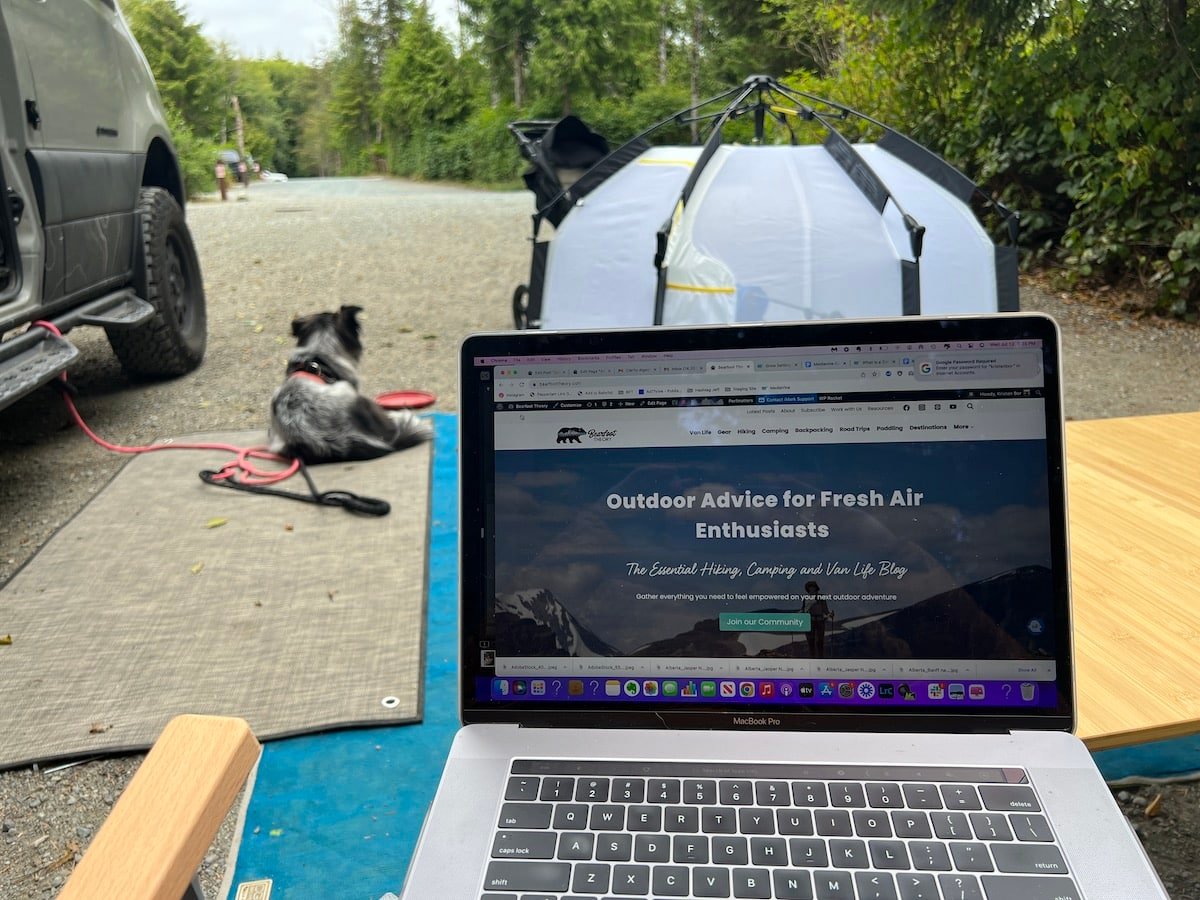
11) Van life helps you grow
If you are looking for ways to push yourself out of your comfort zone and grow as a person, full-time van life is a great opportunity for this.
I have become an overall more confident person by proving to myself that I can take care of myself independently on the road and navigate challenging situations. Although there are occasional moments when I may feel anxious or stressed, van life has taught me how to count on myself instead of depending on someone else to help or rescue me.

Cons of Full-Time Van Life
Just as there are numerous advantages to living on the road, there are also cons of full-time van life. Social media tends to portray the glamorous parts of van life, but there are important points to consider when deciding if this lifestyle is practical for you. This section addresses eight of the downfalls.
1) Finding jobs and working from the road can be challenging
Full-time van life can be very different depending on if you have to work. Although this may not be a con for some who already have a remote position or seasonal job, it can be difficult for others to find a remote job that allows them the freedom and flexibility to travel. However, remote positions are much more common nowadays.
This blog has been my full-time job since 2014. I have three contractors who help me behind the scenes, and it’s not uncommon for me to put in 60-hour work weeks. Reliable Wi-Fi for van lifers who are working remotely is very important.
Luckily I love being an outdoor blogger, but this means when I’m living in my van, there are a lot of days sitting in coffee shops and staying in towns instead of being off-the-grid. Many days I have to skip hiking and doing other fun things so I can get things done. My experience as a full-time van lifer is very different than someone who can quit their job altogether and live off of their savings for a year or two, completely on their own terms.
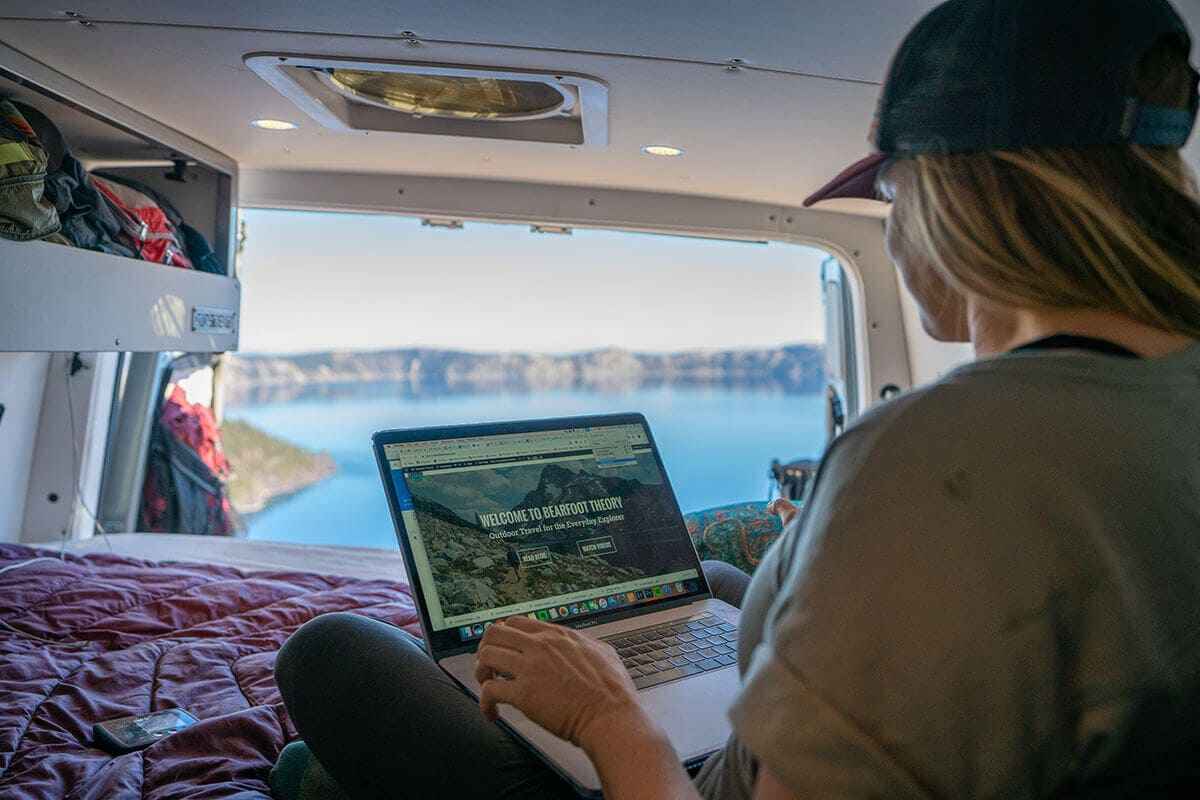
Over the years, my team members – some of whom also happen to be van lifers – have come from a variety of backgrounds, including teaching, massage therapy, and e-commerce. All of them used van life as an opportunity to pursue a new career path as freelancers. So while I won’t sugarcoat the difficulties that come with freelancing, it can be done if you’re dedicated to making it work.
Working on the road takes a whole different level of diligence compared to working in an office or even from home. When an adventure is staring you in the face every morning, it takes dedication to sit at the computer rather than lacing up your hiking boots. You’ll want to consider how you might establish routines and systems to help yourself be productive on the road.
While remote jobs allow you to have the flexibility to travel all year long, some travelers prefer to stay in one spot for a season to make enough money to last them the rest of the year. There are many ways you can go about finding both types of work, but just know that it may take time to land the right position for you. I recommend having a plan for making money on the road before you start full-time van life.
2) Van life can be difficult on relationships
If you plan to travel with your romantic partner, you will need to learn how to live in a van with your significant other. You might go from spending nights and weekends together at home to spending every waking moment together in the van. This has the potential to affect your relationship in both positive and negative ways.
For the first two years of van life, I was mostly solo. My partner Ryan and I were dating, but he could not come with me for longer than quick trips due to his work. Eventually, I was making enough from my blog to support both of us on the road, so he took six months off from work so he could travel with me.
Going from solo van life to being with someone 24/7 was a big adjustment. Overall, I’d say van life has helped us grow together and strengthened our relationship. Living in such a small space is an opportunity to learn about your partner and connect more deeply, but it requires a lot of work, too.
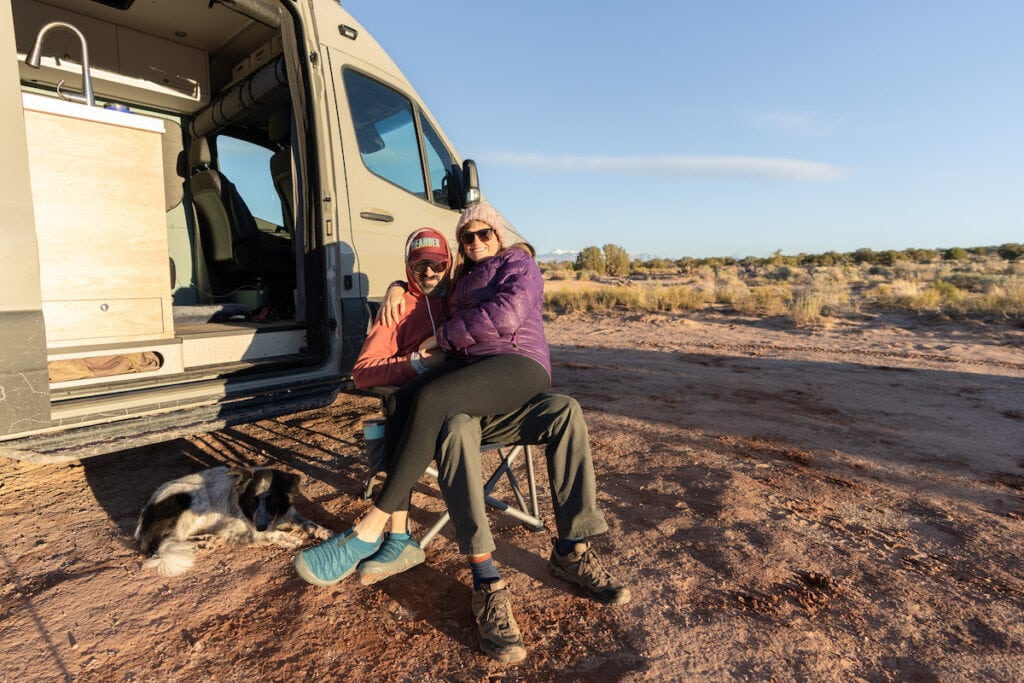
With the daily decisions of what to do, where to camp, what to cook, and whether the van is level for sleeping (our most common argument), you have to pick your battles and learn to compromise. You’ll also need to forgive and forget quickly after arguments and avoid blaming each other when things don’t go according to plan. If you can’t do these things, your relationship will surely suffer.
For Ryan and I, it has also been helpful to split up chores and establish routines so there’s no arguing about who has to do what. When we’re getting the van ready to drive, Ryan takes care of packing up the gear in the garage, while I deal with tidying up the inside of the van. Ryan cooks while I work on my computer. I make the bed every morning, while Ryan takes the dogs out. With clear expectations, it feels like both of us are contributing equally to our life on the road.
3) Van lifers have a lack of basic amenities
You don’t realize how many aspects of daily life you take for granted until you no longer have them. A con of van life is your van surely won’t have a washing machine, dishwasher, or endless hot water. It may not even have a van toilet, shower, or ample electricity.
On the flip side, van life teaches you to make do. You start to see things like the occasional hot shower as a luxury. You learn how to cook a meal using fewer dishes so you don’t have to waste water. You make your clothes last several weeks before you suck it up and go to a laundromat. You make sure to turn off the lights and other electronics so you don’t waste your precious electricity. You’ll become an expert on how to find public amenities like dump stations, showers, and more.
If these sacrifices sound miserable, van life is probably not for you. You can work around some of them by designing your van build around your specific needs, but even so, there are some things you just can’t have in a van.
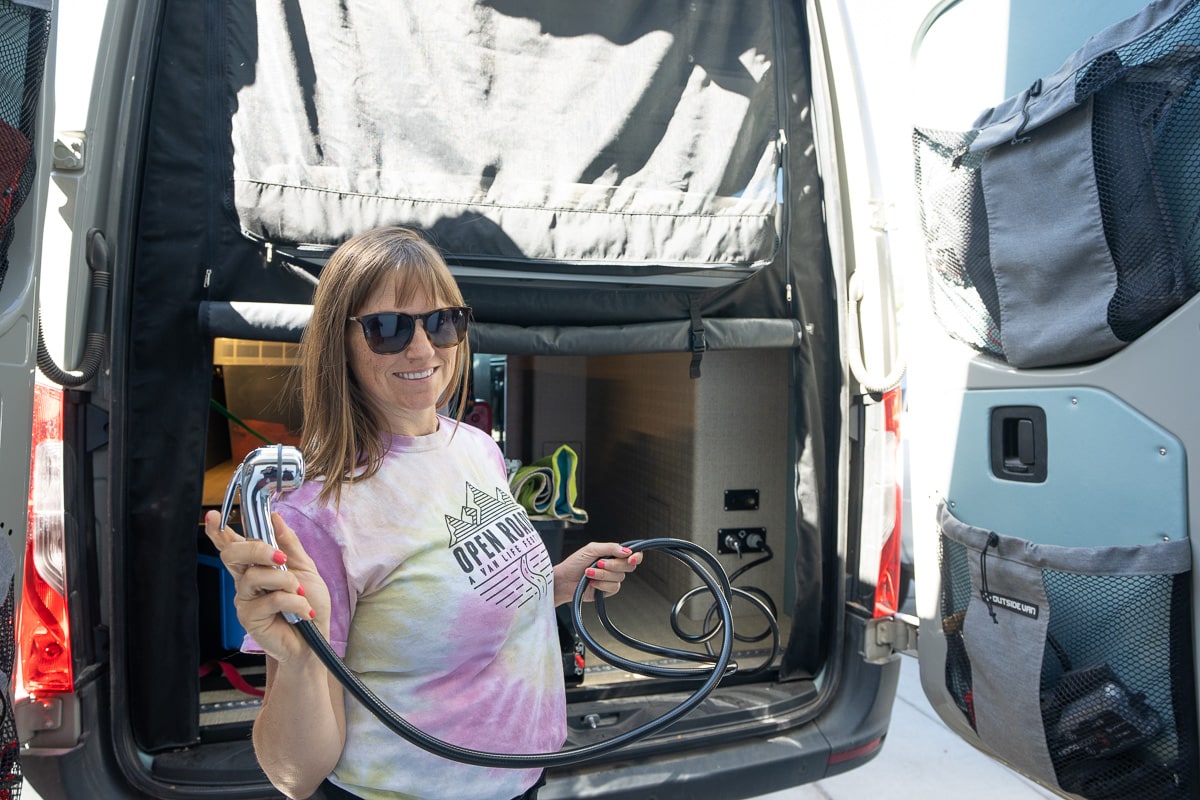
4) You have to constantly plan
This is probably my least favorite thing about van life. While some may thrive on the process of planning trips and creating itineraries, it can be exhausting to do this for so many little decisions every single day. As a full-time van lifer, you must find places to park each night (and often make backup plans), places to shower, laundromats, grocery stores, and water hookups.
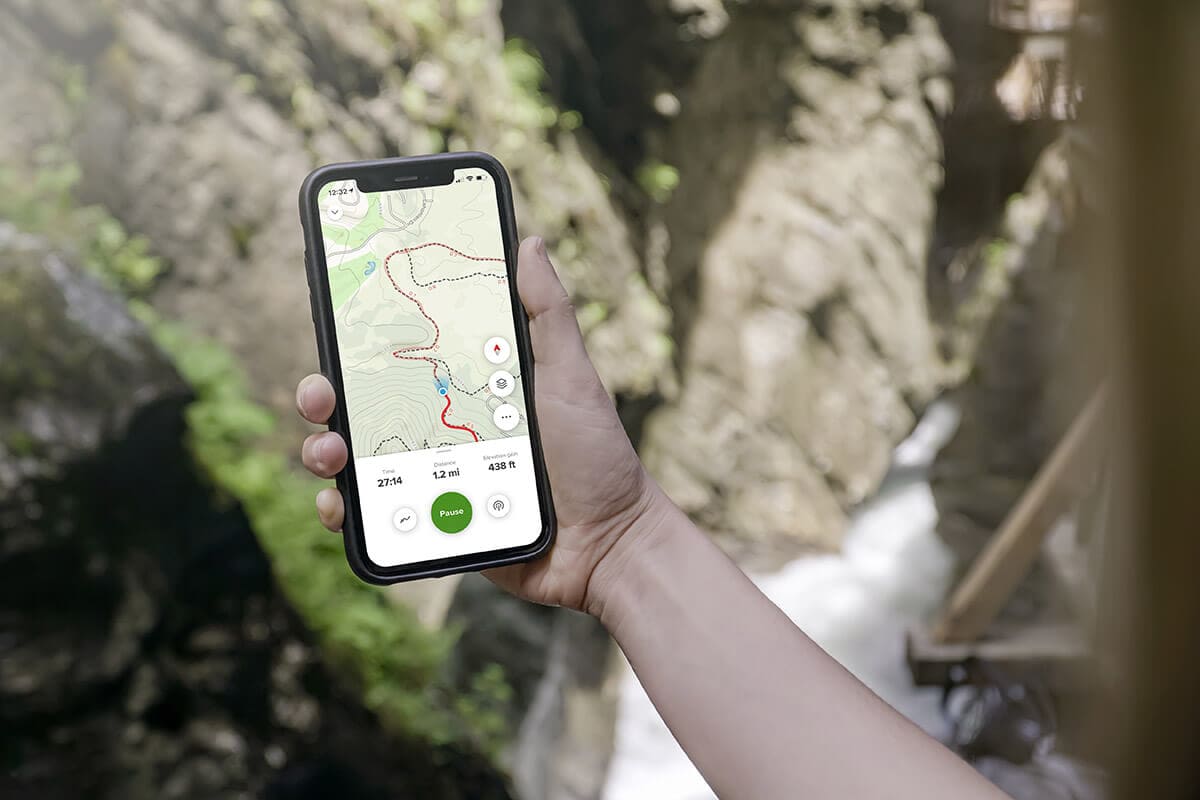
Before visiting tourist attractions and hiking locations, you also need to research these places ahead of time and purchase the necessary tickets and permits. This means you’ll be spending a lot more time on your phone than you might expect.
Even with all of the campsite finder apps, finding places to park each night can be one of the most stressful parts of van life. Places may be closed, full, or more difficult to access than the description leads you to believe.
Reading van life blogs such as this one can help save you time and stress in your planning. I also suggest reaching out to friends for their recommendations in areas you are less familiar with and using apps to help you find free campsites.
#1 campsite finder app
Try The Dyrt PRO free for 30 days
Get a FREE 30-Day membership to The Dyrt PRO, one of our favorite apps for finding campsites.
Perks include:
• 5,000+ free camping locations
• 1,000+ campground discount network
• $0 extra booking fees
• Get reservations at sold-out campgrounds, and more
Use the code BEARFOOT to get 30 days free!
5) Winter can be tough
If you want to do van life in winter and visit different ski resorts, the most important thing is that your van is built for 4-seasons. That means your water systems need to be completely inside the van, you need to have good insulation and a quality heater that will prevent you (and your pipes) from freezing, and an electrical system that can keep up with winter’s demands. You’ll also need warm blankets and lots of warm layers, especially if something goes wrong with your heater.
Even if your van is ready to deal with the climate, there are some things to keep in mind if you plan to do van life in winter. The reality is you’ll be spending up to 15 hours a day inside your vehicle due to it getting dark and cold so early. This can be especially tough if you have pets in your van that thrive on getting outside.
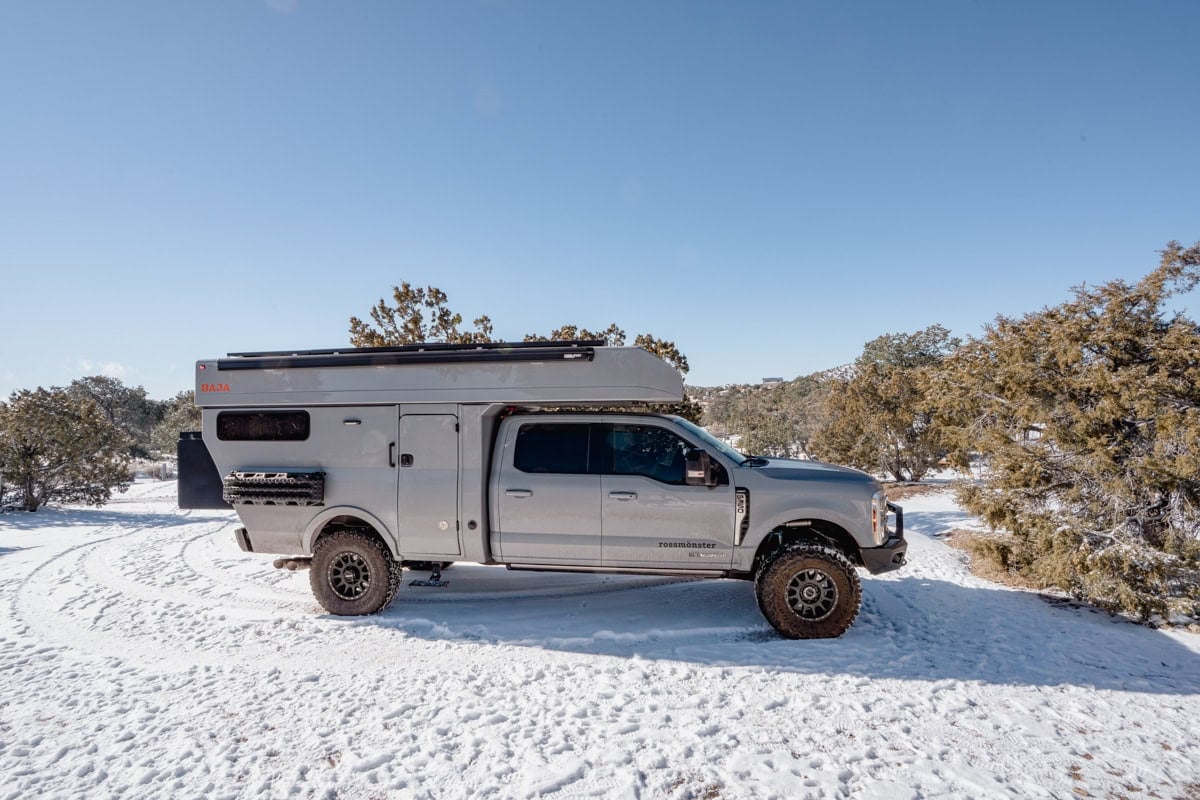
You’ll need to make a plan for how you’ll entertain yourself at night. Going to bars and restaurants to fill up your time gets expensive quickly, so you’ll need to embrace a hobby and be okay with sitting inside the van for extended hours in the evenings. Consider cooking, reading, journaling, playing games, or knitting – the kinds of hobbies that don’t take up a lot of space. There’s also Netflix or getting work done in the evenings if you’re working remotely.
The challenges are compounded by the fact that a majority of ski areas are not very van-friendly. Many have no-overnight parking rules due to snow plows, avalanche danger, or trying to force people to pay for hotels. Of course, there are some exceptions, but you need to do your homework. Otherwise, you’ll be forced to stealth camp, which can be difficult in small mountain towns with strict rules.
For that reason, many van lifers flock south in the winter to places like Southern California, Arizona, Baja, and Florida.
6) You have to think about your safety more often
Although I rarely feel unsafe in my van, it is something that is always at the forefront of my mind. Whether you are traveling with a partner or solo as a female van lifer, you can take steps to feel confident in preventing yourself from getting into vulnerable situations.
Some precautions I take are choosing my campsites carefully, keeping my doors locked when I’m inside the van, and using privacy curtains to keep people from seeing inside my van. I also keep my driver’s seat clean and know where my keys are at all times.
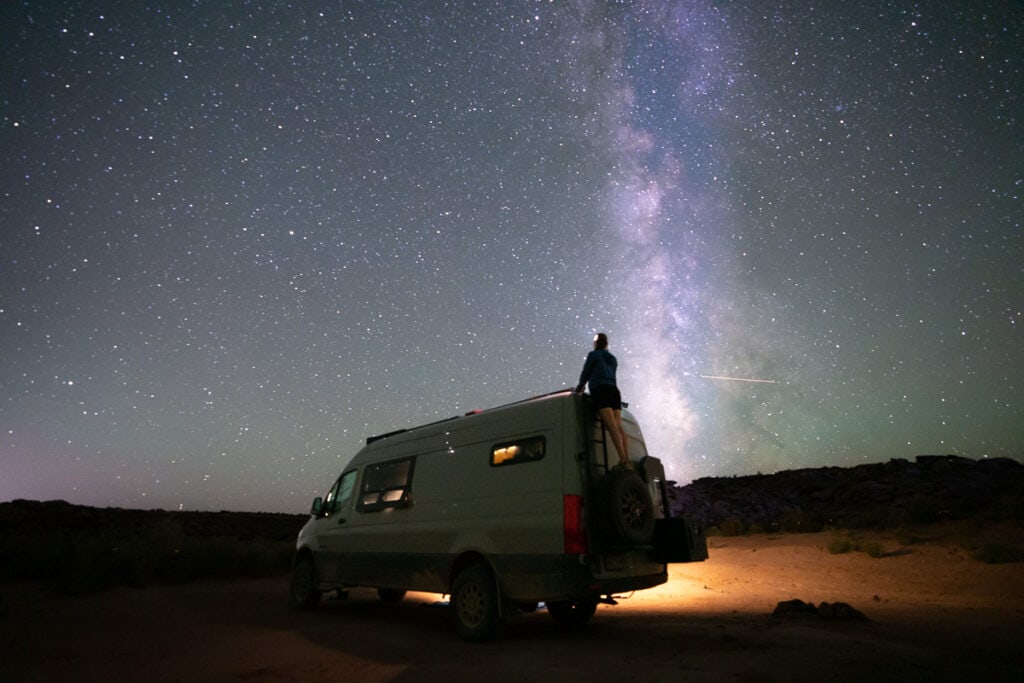
If worse comes to worse, be prepared to defend yourself. Have a plan for how you will self-protect in the face of danger. Above all, trust your gut. If you have a bad feeling, follow your intuition. If I get a bad vibe in a spot or don’t feel comfortable leaving my van parked somewhere, I change course and create a new plan.
In addition to protecting yourself, you also want to consider protecting your valuables. Since you have all of your belongings on you at all times, living full-time in a van presents its unique set of risks. Consider investing in protective lock boxes for expensive items or security cameras.
All of these precautions are especially important to consider when you’re staying in areas without cell phone reception. Make sure you have a plan for how you will handle an emergency or safety situation wherever you go.
7) You need a backup plan in case something happens to your van
An inevitable part of owning a vehicle like a van is accepting that it will likely need repairs in your time of owning it. Since your vehicle is also your home, it is important to have a backup plan of where you will go if your van ends up needing repairs or you get into an accident.
Some full-time van lifers stay with friends or family if they are living in an area where they have this option. Others may need to get a hotel at the last minute. I recommend having money reserved for this in your emergency fund just in case. Sometimes insurance will cover this depending on your policy.
Unfortunately, you don’t have total control over what happens to your van. If you go into this lifestyle knowing that the day may (and likely will) come that you will need to make other arrangements, it won’t be as stressful or surprising when a breakdown or accident happens to you.
8) You may feel judged or stigmatized
Although van life is becoming more popular and acceptable, there is still a stigma associated with living in your vehicle and not working a traditional 9-5 office job. Some people will be excited for you when you tell them the news, and others will think you are crazy and possibly judge you.
My team and I all remember telling our family and friends about our decisions to do full-time van life. It seems we all got a very similar reaction. A few people shared our excitement, sent travel recommendations, and wished us the best. Others did not know how to respond and wondered how we would make it work. Then there are the concerned ones who send you articles about the dangers of travel and why you should reconsider your decision to live on the road full-time.
Be prepared to know your “why” behind van life and feel confident in explaining your decision to others. While the majority of people are curious and mean well, some also tend to push back or feel threatened by a nontraditional way of living.

Is full-time van life right for you?
When considering the pros and cons of living in a van and whether you are ready to give up your apartment or home altogether, take time to reflect and evaluate if full-time van life is right for you. If you are planning to live in your van with your partner, you will want to be sure to discuss these points together. Remember that part-time van life is also an option, so if you aren’t ready to take a permanent dive, you can always use the van as an escape on the weekends and for vacation.
Before diving into van life, I highly recommend renting a van for a road trip so you can try it out first. That way you can experience the pros and cons of living in a van before going all in.
Save this post to Pinterest
More Van Life Tips
What benefits and challenges are you preparing for as you consider full-time van life? What questions do you have? Let me know in the comment section below!




